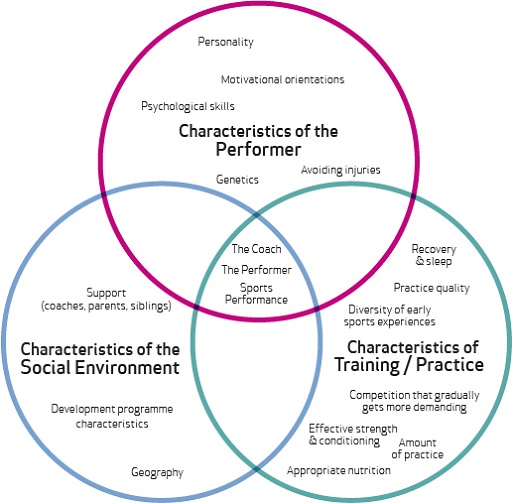5 Coaching and psychology in sports performance
It appears that psychology as the study of the mind and behaviour is extremely relevant to understanding sporting performance; but how does it link to a range of other factors, including the work of a coach?
In Figure 2, which draws on extensive research from Collins et al. (2016) and Rees et al. (2016), a range of factors that contribute to sporting success are grouped under three headings: the performer, the overall social environment, and training and practice. There is a lot of overlap between each category indicating the links between them. For example, to avoid injuries (the performer), you would consider the type of training being done (training and practice) and the availability of coach/family support (the social environment). This type of diagram is known as a Venn diagram.
The prominence of coaching in Figure 2 is evident, since a coach guides most of what falls under the training and practice heading. Coaches also influence:
- athletes’ recovery, conditioning, nutrition and competition entries
- athletes’ social environments, by being one of the people who provide support
- athletes in becoming more aware of their motivation and psychological skills.
You may have wondered what is meant by ‘personality’ and ‘motivational orientations’ under the performer category. ‘Personality’ refers to the characteristics that form an individual’s distinctive character, while ‘motivational orientations’ refers to the tendency to be driven to act in certain ways.
Now take a look at what Alex Danson says about this figure.
Alex says …
There were a huge number of factors that contributed to the success of the GB women’s team in Rio. One of the key influences was our coaching team and creating a social environment (culture) that promoted behaviours that drove and improved performance. Danny Kerry forged a team of support staff that had our wellbeing and performance at the front of their minds. We worked closely with a nutritionist, sports psychologist, and a strength and conditioning coach to support our development.
We created a clear vision: ‘Be the Difference’, ‘Create History’ and ‘Inspire the Future’ and a set of values: ‘We are One Team’, ‘We are Winners’ and ‘Be Alive’. We brought these to life in our everyday behaviours, linking a lot of our language to specific training sessions. For example, on Thursdays we created a session called ‘Thinking Thursday’, which was a highly competitive inter-squad tournament with the sole outcome of finding a way to win and creating an environment where ‘We are Winners’. We would have to perform under fatigue, with changing rules, and come up with a plan that would give our teams the best chance of success. In this example, Danny (the coach) created the environment that put us under pressure and ensured that this training was highly competitive. Creating this environment meant we were able to transfer some of the winning characteristics needed when we reached our Olympic Final in Rio.
Figure 2 is a visual tool to illustrate how a range of factors contribute to explaining sporting success. You could easily add further factors but, as you can see, it has been kept relatively simple at this stage.

